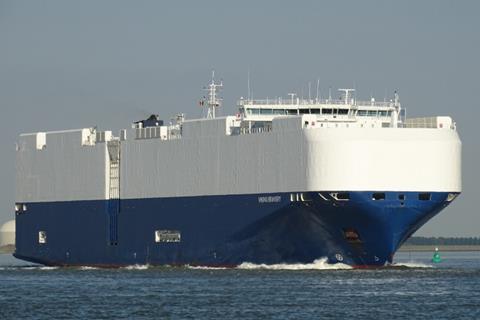Shipping Agencies Services Sárl (SAS), a subsidiary of Mediterranean Shipping Company (MSC), has bought a majority 97% stake in Gram Car Carriers in a deal valued at around $693.3m. The acquisition is expected to be complete on July 25.
Gram Car Carriers, which is based in Norway, has a fleet of 17 pure car and truck carriers (PCTCs). It claims to be the world’s third-largest tonnage provider within the PCTC segment.

SAS has received regulatory approvals from the Japan Fair Trade Commission and from the relevant authorities in Ukraine and Portugal.
Its decision to buy one of the biggest PCTC providers indicates that the car carrier market is currently hot property. Time-charter rates for ro-ro vessels have increased to record highs and spot rates have also increased.
“The interesting aspect of this deal is that Gram Car Carriers fleet is fixed out to operators on long-term charters, and the car carrier market has recently peaked, suggesting MSC’s interest in ro-ro business is long-term,” said Andrea de Luca, Veson Nautical’s maritime analyst.
Tight capacity
The post-pandemic years have seen high demand from carmakers for vessel capacity, which shrank during the Covid closedown. As vehicle manufacturing output rebounded demand outstripped supply, exacerbated by more recent disruption to services in the Red Sea which has added an average 20 days added to global shipping times. While new vessels are built and delivered carmakers have been turning to direct vessel chartering and containerised vehicle shipments among their responses, though there are now signs that the tight capacity is easing as more vessels are delivered.
Data from shipping analyst Vessels Value backs that up. Its 1-Year Time-Charter Index for 6,500 CEU and 5,000 CEU-capacity vessels is currently $113,500 and $84,300 per day respectively, down from $123,500 and $91,300 per day in Q1 2024.
“Rates have eased off from a lack of supporting transactions and weaker market sentiment,” said de Luca. “China is concerned about recent EV tariff hikes set by Europe, and slowing demand for EV sales in western Europe as a major buyer, but so far, they have managed to find buyers elsewhere including Brazil and Mexico.”
Ro-ro ownership
MSC is not the first global container shipping line to move more seriously into the finished vehicle sector. CMA CGM bought Gefco in 2022, rescuing it from potential sanctions against Russia following the invasion of Ukraine. Gefco was previously owned by Russian Railways. CMA CGM incorporated Gefco into Ceva Logistics, which it had previously bought in 2019.
Cosco Shipping’s vehicle and machinery division, Cosco Shipping Specialized Services, has also just launched two new 7,500 CEU dual-fuel pure car and truck carrier (PCTC) vessels, part of a larger order established in 2022 for 24 large-scale LNG dual-fuel ro-ro ships with capacities ranging from 7,000 to 8,600 parking spaces.
MSC’s portfolio includes full ownership of Grandi Navi Veloci (GNV) and a 49% stake in Moby, which are two leading ferry operators in the Mediterranean area competing with Grimaldi for ro-ro freight and passenger business, according to de Luca. That is in addition to two active PCTCs on long term charters. Given that, it is not a complete surprise that MSC’s founder, owner and chairman, Gianluigi Aponte, has bought Gram Car Carriers, said de Luca.
“Additionally, competitors CMA CGM, Cosco, and ZIM through its owned company GSL (Gold Star Line), have ramped up interest in PCTCs in recent years via long-term charters and newbuild orders, which has obviously caught the attention of MSC,” said de Luca. “Evidently, car trade has become hot property for global container carriers, and perhaps Maersk may regret their divestment in Höegh Autoliners earlier this year.”
Maersk sold its 10.2% stake in Höegh but it remains to be seen whether the company will make its own PCTC orders.
Suardíaz recently bought a PCTC vessel from Gram Car Carriers, which was looking for $64.6m to capitalise on high second-hand vessel values at a time of short capacity in maritime finished vehicle transport.


























![Global[1]](https://d3n5uof8vony13.cloudfront.net/Pictures/web/a/d/s/global1_726550.svgz)













No comments yet